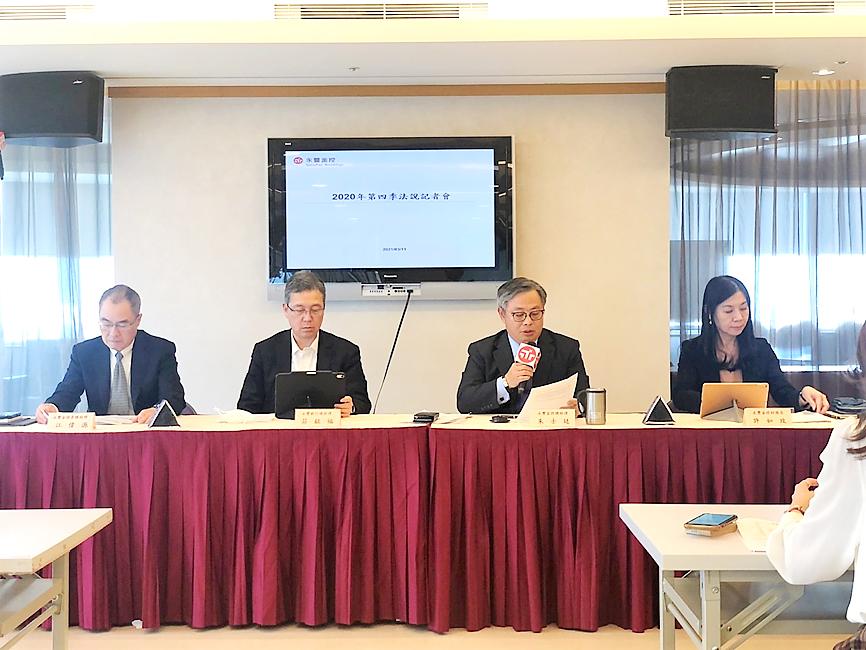SinoPac Financial Holdings Co (永豐金控) aims to generate 30 percent of its profits from overseas operations this year, as well as expand its operations in Vietnam and open a Singapore branch, SinoPac Financial president Stanley Chu (朱士廷) said yesterday.
Its banking arm, Bank SinoPac (永豐銀行), set up a branch in Ho Chi Minh City focused on lending to Taiwanese companies with operations in Vietnam, but it is shifting to tap the consumer financing market, spokeswoman Kerry Hsu (許如玫) told the Taipei Times by telephone.
The bank would start with personal loans in Vietnam, as it expects the nation’s rapid economic growth and rising middle class to boost the growth of consumer loans, Hsu said.

Photo: Kelson Wang, Taipei Times
The Financial Supervisory Commission last year approved the bank’s plan to establish a Singapore branch, he said.
The bank expects to receive regulatory approval in Singapore this year to open the branch, which would be its fourth overseas market, after China, the US and Vietnam, he said.
“We had concentrated on expanding our presence in China in the past few years, by establishing units in eastern and western China. Now we are shifting our focus to Southeast Asia, given the region’s growth momentum,” Hsu said.
The ratio of net earnings generated by SinoPac’s overseas operations to its total net earnings rose from 24 percent in 2019 to 30 percent last year, although SinoPac’s overseas units saw profitability deteriorate due to bad loans amid the COVID-19 pandemic, he said.
SinoPac’s offshore banking unit reported higher profit last year because of strong demand for wealth management and capital management from returning Taiwanese firms, Hsu said.
Due to problematic loans to Pharmally International Holding Co (康友製藥) and Shenzhen Zhaoheng Hydropower Group (兆恆水電), a Shanghai-based unit of China Energy Reserve and Chemicals Group Co (中國國儲能源), Bank SinoPac had to recognize loan-loss provisions of NT$790 million (US$28 million) last year, affecting the bank’s profits, she said.
The loss also accounted for the bank’s net profit falling 5 percent year-on-year, despite its net interest income and net fee income rising to their highest level, Hsu said.
Despite the central bank’s interest rate cuts, Bank SinoPac’s interest spread, the difference between its lending and deposit rates, grew 7.9 basis points to 1.3 percent at the end of last year, due to reduced funding costs, she said.
“Demand deposits made up 50 percent of our total deposits, compared with 40 percent a year earlier, which helped lower our funding costs, as the rates we pay demand depositors were the lowest among all kinds,” Hsu said.

SETBACK: Apple’s India iPhone push has been disrupted after Foxconn recalled hundreds of Chinese engineers, amid Beijing’s attempts to curb tech transfers Apple Inc assembly partner Hon Hai Precision Industry Co (鴻海精密), also known internationally as Foxconn Technology Group (富士康科技集團), has recalled about 300 Chinese engineers from a factory in India, the latest setback for the iPhone maker’s push to rapidly expand in the country. The extraction of Chinese workers from the factory of Yuzhan Technology (India) Private Ltd, a Hon Hai component unit, in southern Tamil Nadu state, is the second such move in a few months. The company has started flying in Taiwanese engineers to replace staff leaving, people familiar with the matter said, asking not to be named, as the

The prices of gasoline and diesel at domestic fuel stations are to rise NT$0.1 and NT$0.4 per liter this week respectively, after international crude oil prices rose last week, CPC Corp, Taiwan (台灣中油) and Formosa Petrochemical Corp (台塑石化) announced yesterday. Effective today, gasoline prices at CPC and Formosa stations are to rise to NT$27.3, NT$28.8 and NT$30.8 per liter for 92, 95 and 98-octane unleaded gasoline respectively, the companies said in separate statements. The price of premium diesel is to rise to NT$26.2 per liter at CPC stations and NT$26 at Formosa pumps, they said. The announcements came after international crude oil prices

DOLLAR SIGNS: The central bank rejected claims that the NT dollar had appreciated 10 percentage points more than the yen or the won against the greenback The New Taiwan dollar yesterday fell for a sixth day to its weakest level in three months, driven by equity-related outflows and reactions to an economics official’s exchange rate remarks. The NT dollar slid NT$0.197, or 0.65 percent, to close at NT$30.505 per US dollar, central bank data showed. The local currency has depreciated 1.97 percent so far this month, ranking as the weakest performer among Asian currencies. Dealers attributed the retreat to foreign investors wiring capital gains and dividends abroad after taking profit in local shares. They also pointed to reports that Washington might consider taking equity stakes in chipmakers, including Taiwan Semiconductor

A German company is putting used electric vehicle batteries to new use by stacking them into fridge-size units that homes and businesses can use to store their excess solar and wind energy. This week, the company Voltfang — which means “catching volts” — opened its first industrial site in Aachen, Germany, near the Belgian and Dutch borders. With about 100 staff, Voltfang says it is the biggest facility of its kind in Europe in the budding sector of refurbishing lithium-ion batteries. Its CEO David Oudsandji hopes it would help Europe’s biggest economy ween itself off fossil fuels and increasingly rely on climate-friendly renewables. While